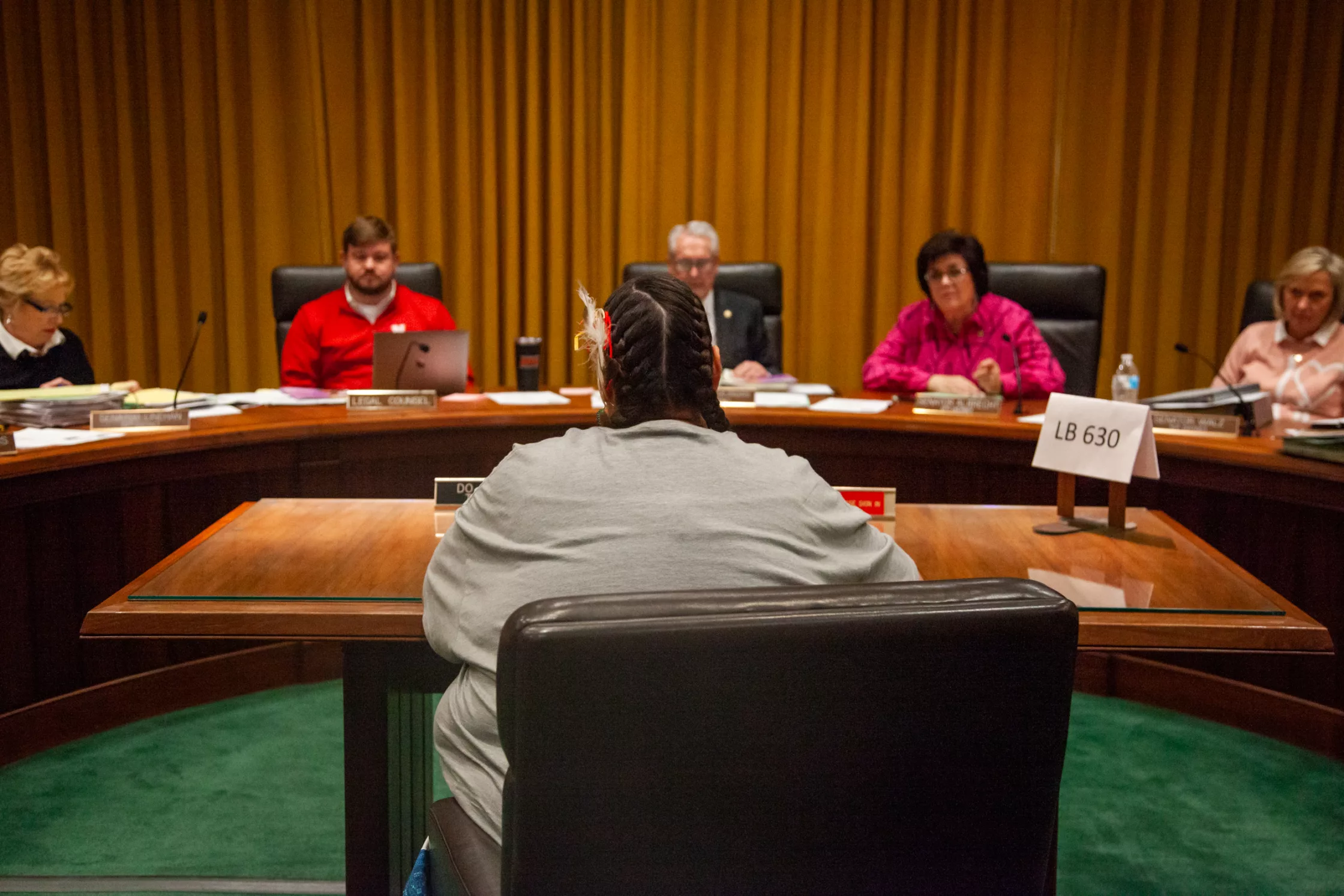Editor’s note: This legislation later passed in an amended version as part of another bill on June 1, 2023.
The Native woman wearing feathers in her braided hair took a seat facing eight members of the Nebraska Legislature.
Alice Johnson stared down at the paper in her hands, the speech she’d practiced over and over until no amount of nerves could mask its message.
“Our hair, our regalia, it’s who we are. It’s who our ancestors were. It’s our identity,” she told the state senators, members of the Legislature’s Education Committee, on Feb. 13 at the Nebraska State Capitol. “Everyone has the right to freely express themselves and show their individuality. So why can’t we as Native Americans?”
In 2020, two of the daughters of Johnson and her wife Norma Leroy told their mothers that a school secretary had cut their hair during an alleged lice check. The mothers told the school why this upset them – that hair was integral to their culture and beliefs. Their concerns allegedly got nowhere in Kilgore, a town of 77 residents that’s 22 miles west of Valentine. The family’s grief and outrage became a national story – and the basis of an ongoing ACLU of Nebraska lawsuit against the school.
Now, the two women say, the bill Johnson testified for – a bill meant to protect their children’s right to wear their hair as they choose – represents the first sign or progress.
“I feel like it’s a stepping stone,” Johnson said.
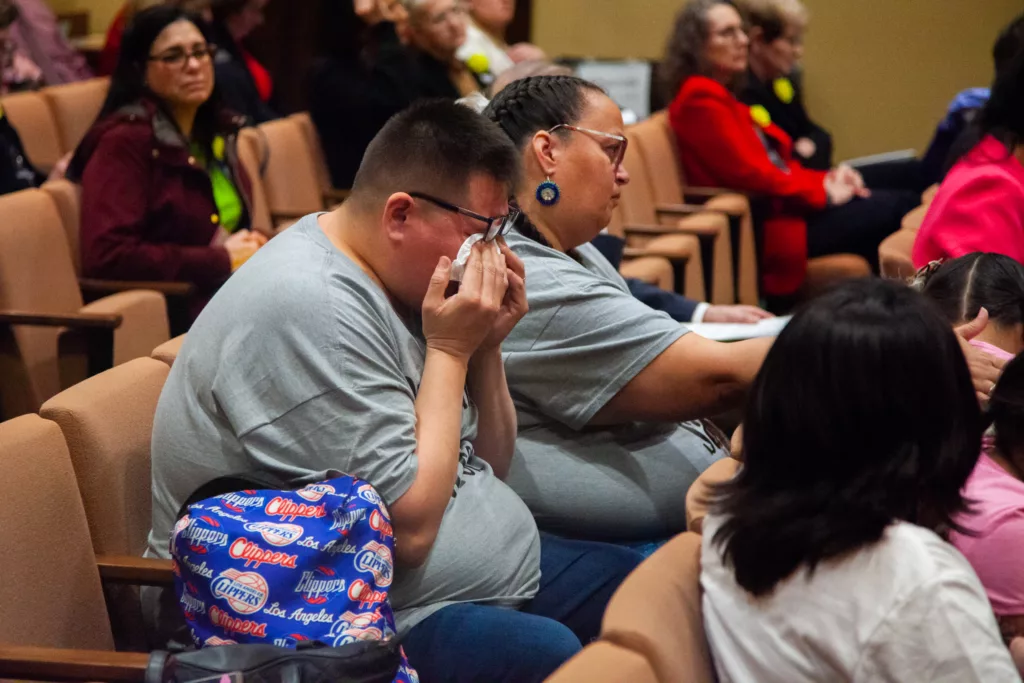
Introduced by State Sen. Terrell McKinney of North Omaha, LB630 would require all Nebraska schools adopt a written dress code and grooming policy that would not discriminate against anyone’s hair or dress based on race, religion, sex, disability or national origin.
The idea for the bill grew from a past McKinney’s bill to protect workers against discrimination for wearing natural hairstyles. That effort passed with wide bipartisan support. Gov. Pete Ricketts signed it into law in 2021.
Extending protections to students seemed the next logical step, McKinney said. The Legislature’s Education Committee appears to agree, unanimously voting to advance the bill this week, sending it to a full debate on the floor of the Nebraska Legislature.
When he heard stories like the story of the Lakota girls’ haircutting – a story featured in USA Today and other national publications after the Flatwater Free Press reported it in Sept. 2021 – the importance of the bill became clear, McKinney said.
“How can you grow the state if you’re not being welcoming to diverse communities?” McKinney said. “We have to have things in place … that allow kids to be themselves.”
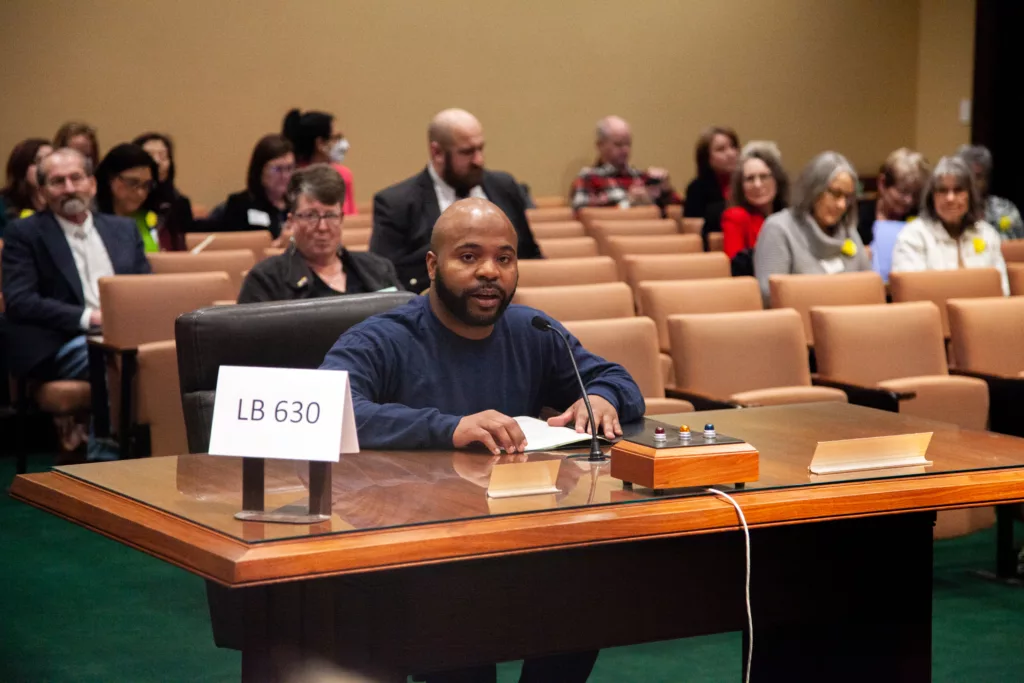
McKinney’s office partnered with the ACLU of Nebraska on the bill after the group obtained dress code and grooming policies from 20 different school districts across Nebraska. All 20 had vague language allowing school administrators and staff wide discretion on things like hairstyle. Several banned clothing that could be culturally or religiously significant, according to an ACLU report. Many of the policies included suspension or expulsion as a consequence.
Proponents for the bill included Native, Black, Muslim and LGBTQ+ advocates. Jordan Mason, president of the Muslim Law Students’ Association at the University of Nebraska College of Law, said it’s the sign of a special cause when people from so many different backgrounds come together under a unified message.
“If you wanted a picture perfect definition of what an intersectional bill looks like, it’s this one,” she said.
For Mason, who attended the Valentine’s Day hearing wearing a pink suit jacket and hijab, a bill like this shows the common interests many Nebraskans share. She chose to start covering her hair a few years ago as a first-year law student. She said she has received nothing but support at the law school. She wants that same feeling of acceptance extended to all Nebraskans.
“I think it does make Nebraska a more welcoming place to be,” Mason said. “Maybe not writ large, but I think our children do represent our state. And if you’re comfortable sending your kids to school on their first day wearing a hijab, you’re more likely to stay.”
Nyomi Thompson, policy and advocacy coordinator for I Be Black Girl, an Omaha nonprofit that advocates for Black women and girls, said allowing school staff and administrators to enforce vague policies leads to more Black students facing discipline. It also sets back their educational attainment, she said.
“Black students continue to be disproportionately targeted by what presents as race-neutral learning policies,” she said, “policies that criminalize cultural expression of black students who are already navigating their own identity.”
McKinney is hopeful this bill will receive the same unanimous support as his past bill that outlawed workplace discrimination of natural hair. He knows nothing is guaranteed.
“I’ve read the online comments, people think it’s not necessary or we should leave it up to school boards,” he said. “But my response to that is our school boards aren’t created equal. Without real cultural competency across the state, we need something like this in place to ensure that kids are protected.”
The result of policy that includes cultural competency can make a big difference, as Alice Johnson and Norma Leroy say they found out first-hand.
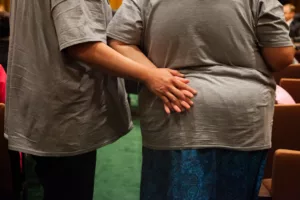
After confronting school administrators about the hair cutting, they moved their five girls from Cody-Kilgore Unified Schools to a private school on the Rosebud Reservation on the South Dakota side of the border. It’s a half-hour drive there and back every morning and afternoon, but Johnson and Leroy feel their kids are safer and spending more time learning about their culture.
There was even an incident where one daughter snipped off the end of her hair. Staff at the reservation school knew exactly what to do, Johnson said.
“We went into the classroom and the teacher gathered the hair, brought in a medicine man and prayed,” Johnson said. “The next morning they discarded the hair properly.”
That’s night and day from a Cody-Kilgore staff member cutting their kids’ hair against their wishes, the mothers say. In that case, the lawsuit alleges, the mothers had to fight to get the hair back so it could be burned in accordance with Lakota beliefs. A Lakota person’s hair is their spirit, Lakota beliefs say. When it’s cut, or even gathers in a hairbrush, it must be burned to release the spirit.
Nearly three years after their daughters’ haircutting in Kilgore, the moms still take them to sweats and pray to rekindle their spiritual connection.
“Just like a tree has branches that extend to the root of the tree, our hair extends to our spirit,” Leroy said. “When our daughters’ hair was cut, we lost a part of who they are.”
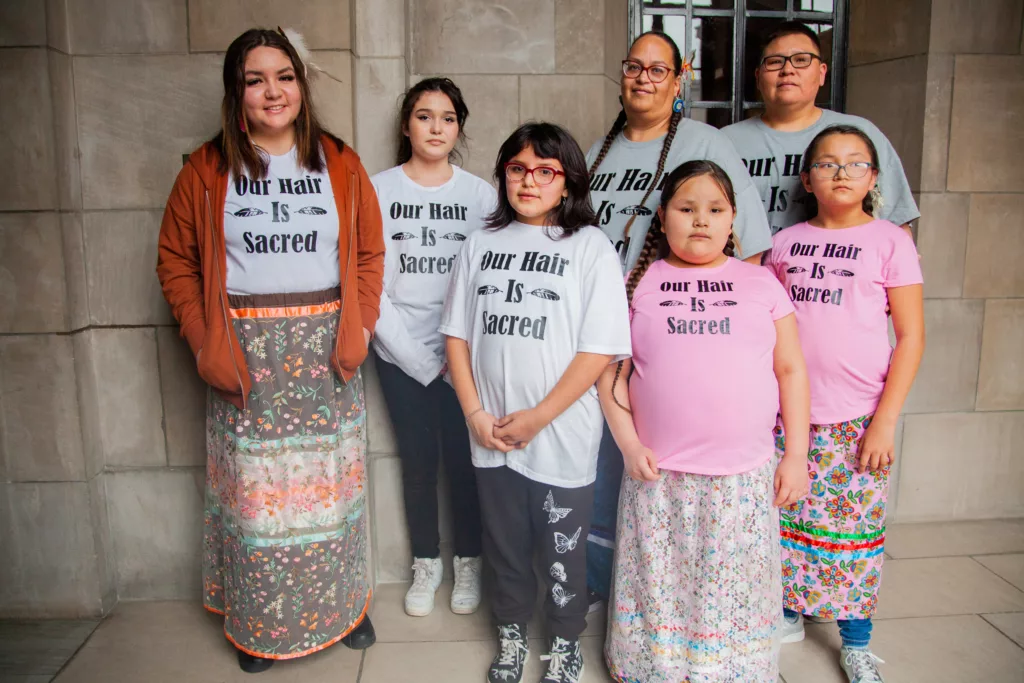
A bill like LB630 won’t make everything better, Johnson and Leroy said. But it’s helping, they say, to reinforce ideas that hair, dress and other ways we express our identity should be protected, no matter what that looks like.
“They’re turning something that happened that was truly negative, into something really positive,” said Rose Godinez, ACLU of Nebraska’s senior legal and policy counsel who represented the parents in their lawsuit against Cody-Kilgore Unified Schools. “And not just for the Native American community, they really are advocating for all students.”

